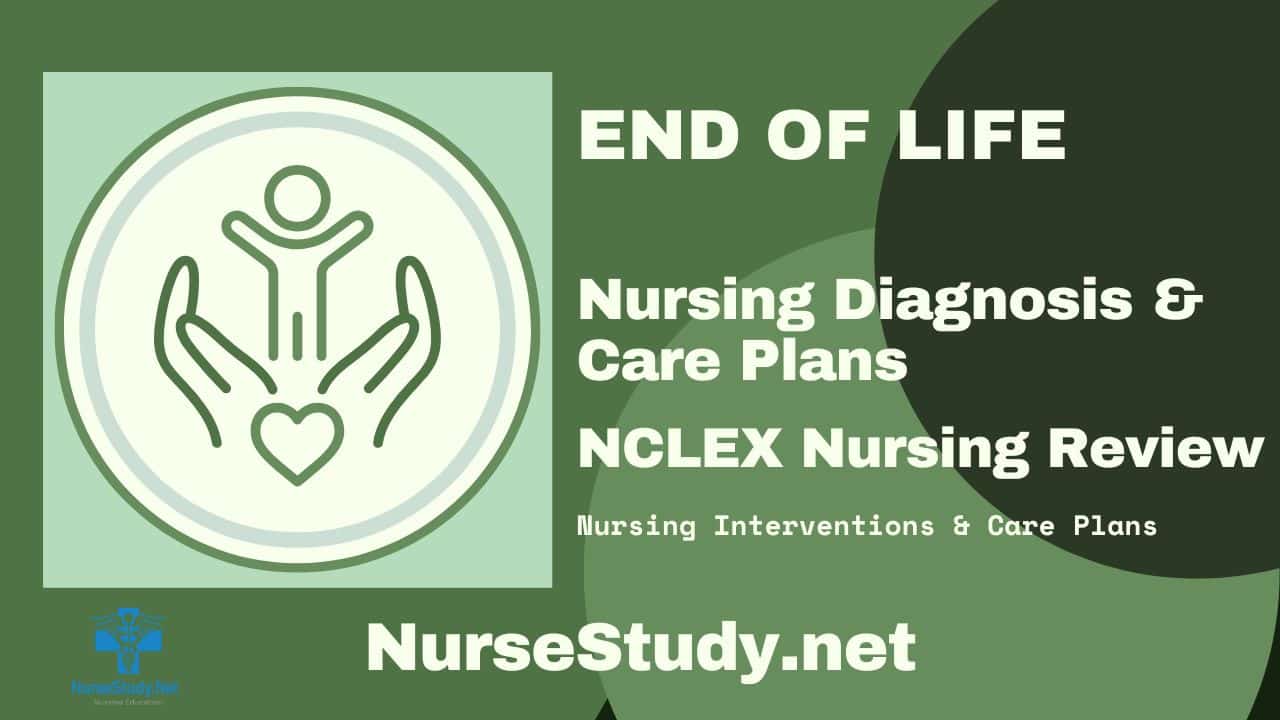End of life nursing care focuses on providing comfort and support to patients during their final stages of life. This comprehensive guide explores essential nursing diagnoses, interventions, and care plans to ensure quality care for terminally ill patients.
Understanding End of Life Care
End-of-life care begins when a patient receives a terminal diagnosis and continues through the dying process. Depending on the underlying condition, this period may span days to years. Nurses are crucial in managing symptoms, providing emotional support, and ensuring dignified care.
Common Signs and Symptoms of End-Stage Disease
Physical changes often occur as death approaches:
- Sensory Changes: Diminished vision, reduced taste and smell, decreased pain perception
- Respiratory Changes: Irregular breathing patterns, Cheyne-Stokes respiration, death rattle
- Cardiovascular Changes: Decreased blood pressure, mottled skin, peripheral cyanosis
- Neurological Changes: Reduced consciousness, confusion, terminal restlessness
- Gastrointestinal Changes: Decreased appetite, reduced bowel motility, incontinence
Nursing Care Plans for End of Life
1. Impaired Comfort
Nursing Diagnosis: Impaired Comfort related to terminal illness manifestations as evidenced by verbal reports of pain, restlessness, and anxiety.
Related Factors:
- Disease progression
- Physical symptoms
- Psychological distress
- Environmental stressors
Nursing Interventions and Rationales:
- Assess pain regularly using appropriate scales
- Administer prescribed medications promptly
- Position patient for maximum comfort
- Maintain optimal room temperature and lighting
- Provide gentle massage when appropriate
- Use complementary therapies as indicated
Desired Outcomes:
- Patient reports improved comfort levels
- The patient demonstrates reduced signs of distress
- Family expresses satisfaction with comfort measures
2. Spiritual Distress
Nursing Diagnosis: Spiritual Distress related to life-threatening situation as evidenced by questioning meaning of life and death.
Related Factors:
- Terminal illness
- Cultural conflicts
- Religious uncertainty
- Fear of the unknown
Nursing Interventions and Rationales:
- Assess spiritual needs and beliefs
- Facilitate visits from spiritual advisors
- Support religious practices and rituals
- Provide active listening
- Maintain therapeutic presence
- Arrange for cultural accommodations
Desired Outcomes:
- The patient expresses a sense of peace
- The patient engages in meaningful spiritual practices
- Family reports satisfaction with spiritual support
3. Risk for Caregiver Role Strain
Nursing Diagnosis: Risk for Caregiver Role Strain related to complexity of care requirements and emotional demands.
Related Factors:
- Extended duration of care needs
- Multiple caregiving responsibilities
- Limited support systems
- Financial concerns
Nursing Interventions and Rationales:
- Assess caregiver coping mechanisms
- Provide education about care techniques
- Connect with community resources
- Encourage respite periods
- Teach stress management strategies
- Facilitate family meetings
Desired Outcomes:
- Caregivers demonstrate effective coping strategies
- Caregivers utilize available support services
- Caregivers maintain personal well-being
4. Anticipatory Grieving
Nursing Diagnosis: Anticipatory Grieving related to expected loss as evidenced by expressions of distress and sorrow.
Related Factors:
- Impending death
- Change in life plans
- Loss of future dreams
- Family role changes
Nursing Interventions and Rationales:
- Acknowledge grief responses
- Support emotional expression
- Facilitate family communication
- Provide anticipatory guidance
- Connect with grief counseling
- Document grief patterns
Desired Outcomes:
- Patient and family express feelings openly
- The family demonstrates healthy grieving processes
- The family utilizes appropriate support systems
5. Impaired Social Interaction
Nursing Diagnosis: Impaired Social Interaction related to end-stage illness as evidenced by reduced social engagement.
Related Factors:
- Physical limitations
- Emotional withdrawal
- Communication difficulties
- Environmental barriers
Nursing Interventions and Rationales:
- Facilitate meaningful visits
- Support communication needs
- Maintain dignity during interactions
- Encourage life review
- Create opportunities for connection
- Document social support patterns
Desired Outcomes:
- The patient maintains desired social connections
- Family reports satisfaction with interactions
- Patient experiences meaningful engagement
References
- Ackley, B. J., Ladwig, G. B., Makic, M. B., Martinez-Kratz, M. R., & Zanotti, M. (2023). Nursing diagnoses handbook: An evidence-based guide to planning care. St. Louis, MO: Elsevier.
- Barry, C., Paes, P., Noble, S., & Davies, A. (2023). Challenges to delivering evidence-based palliative medicine. Clinical Medicine, 23(2), 182-184. https://doi.org/10.7861/clinmed.2022-0336
- Harding, M. M., Kwong, J., & Hagler, D. (2022). Lewis’s Medical-Surgical Nursing: Assessment and Management of Clinical Problems, Single Volume. Elsevier.
- Herdman, T. H., Kamitsuru, S., & Lopes, C. (2024). NANDA International Nursing Diagnoses – Definitions and Classification, 2024-2026.
- Higginson IJ. Evidence based palliative care. There is some evidence-and there needs to be more. BMJ. 1999 Aug 21;319(7208):462-3. doi: 10.1136/bmj.319.7208.462. PMID: 10454384; PMCID: PMC1116373.
- Ignatavicius, D. D., Rebar, C., & Heimgartner, N. M. (2023). Medical-Surgical Nursing: Concepts for Clinical Judgment and Collaborative Care. Elsevier.
- Silvestri, L. A. (2023). Saunders comprehensive review for the NCLEX-RN examination. St. Louis, MO: Elsevier.
- Visser C, Hadley G, Wee B. Reality of evidence-based practice in palliative care. Cancer Biol Med. 2015 Sep;12(3):193-200. doi: 10.7497/j.issn.2095-3941.2015.0041. PMID: 26487964; PMCID: PMC4607825.
